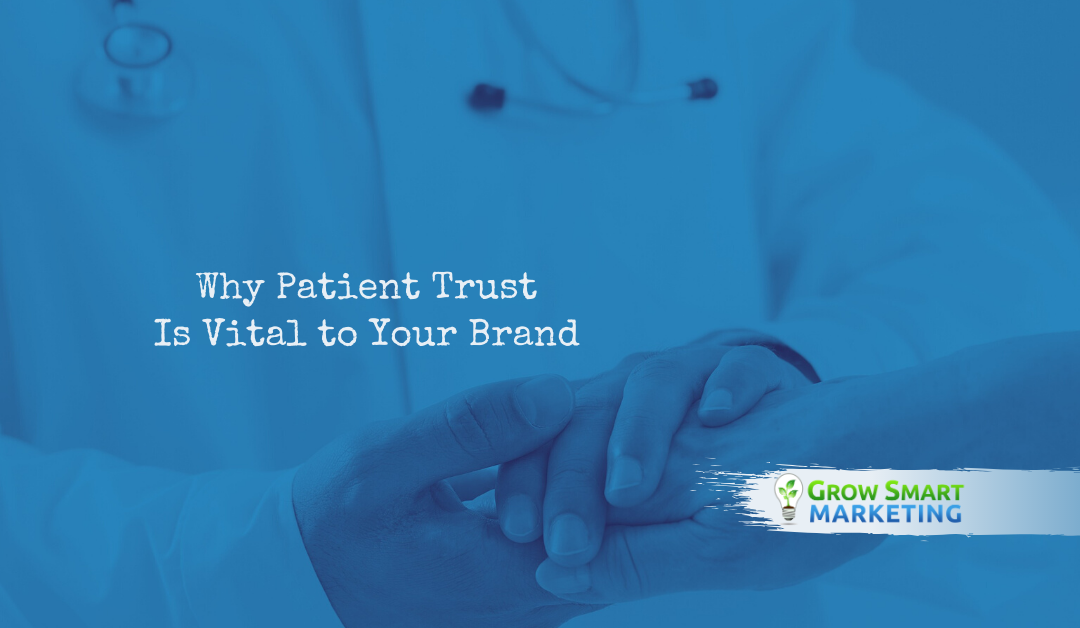
In addition to nurturing lifelong patients that will consistently choose your office over another, patient trust also gives your medical practice a little leeway if problems arise in the future. No matter what may happen, earning the trust of your patients ensures your company’s brand can survive.
So, what is patient trust and how is it earned? This isn’t a new concept, but it’s an area in which many medical practices fail. The transparency that leads to trust is about more than including the standard copy about why your office is better than the rest — you have to truly care about your patients and their problems.
What Is Patient Trust and Why Is It Important?
Ultimately, this trust is about putting the patient first in your content and your products or services.
The reason trust is more important now than it’s ever been is a direct result of the bombardment of information and options available today.
Consumers no longer need to choose between only a few brands. They have virtually limitless options and access to reviews, testimonials and marketing tricks that can give them an idea of what you have to offer. Because of this, marketers need to look beyond the competitive pricing, features, and benefits, and direct their attention more toward the history and legacy. Patients have become empowered and skeptical, so they’re looking for the whole package — one that will not only give them a product or service that’s reliable, but also a medical office and customer service that they can count on now and in the future. Ideally, your product or service will address their needs at the time, but in the event that it doesn’t, they want to know you’ll be there to make it right.
How Is Patient Trust Created?
Authenticity is key. Authenticity is the one thing that transcends industries, generations and cultures, since it’s the universal thing that all patients are looking for. It’s about being transparent and giving the patients what they expect, whether in products or service, and delivering the values of the brand.
Of course, authenticity and transparency are useless for the pure sake of it. You need to be providing content that demonstrates an in-depth understanding of your patients’
needs and expectations, so you can provide them with relevant, valuable solutions. Superlatives, false claims, half-truths and other marketing hype that can’t be verified instantly reads as false, so focus on positive information of substance and value to your patient.

Why Is Patient Trust Hard to Earn?
Fortunately, this issue is easy to combat if you’re truly putting the patient first. A brand must be clear about its purpose and values, as well as being transparent with policy and procedures. Perception is everything, and a company that offers the truth is more likely to have good impressions with potential patients.
There’s been a shift in power between the business and the consumer. In the past, the brand had the power and patients had to accept what was given. Now, consumers have a broad outlook and understand more about what a company should and should not be, so they’re less forgiving of missteps. Patients want a brand that shows its customer loyalty and demonstrates shared values, so an effective strategy would be to align your practice’s values with the information you’d gladly offer to the public.
In addition, transparency is often forced upon brands, since patients can find dirt if they look hard enough. In all likelihood, questionable ethics and practices will leak in other media and be found by patients, leaving a medical practice looking disingenuous and sleazy, which is worse than having no trust at all.
Conclusion
The authenticity and transparency necessary to garner real patient trust comes from honest communications, solid company culture and treating the patient as you would want to be treated, rather than just lip service.
Though it’s clear that consumers want trustworthy brands, their general trust isn’t high. This can be an area of opportunity for new or developing medical practices, or offices looking to revamp their image and surge ahead of competitors. Whether we like it or not, the power is with the patient, so it’s more important than ever to put their needs first for business success.

